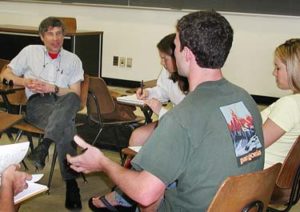Faculty-Student Outreach & Dialogue

There are lots of ways to reach out and include faculty! Students often underestimate how much faculty want to be supportive of student efforts. This is particularly true of projects like Democracy Matters. Faculty are highly supportive of student efforts to get involved in politics. Here are some ways to tap into that support:.
I. Invite One or More Faculty to Participate in a DM Issues Panel
Create an event indoors or in warm weather in an area on campus where people convene and passers-by can stop and listen at their leisure. Set up a microphone and a podium and schedule the following:
1) Invite three (or more) professors to speak on issues of the environment, civil rights, education, health care, globalization (or other topics about which they have expertise – check course guides to find what faculty teach). See Critical Issues Forums.
2) Have a DM chapter member (or more) give a short speech following each professor on how that particular topic relates to money in politics and democracy (ask your DM staff link for help).
II. Adopt A Professor
Every student in the group selects a faculty member or two whom they feel comfortable asking for support. Students then meet with that faculty member, giving him/her flyers and other information about Democracy Matters and asking him/her to take one of the 17 possible actions listed below.
In addition, you might send out a general email to all faculty in key departments or programs (Political Science, Sociology, History, Women’s Studies, American Studies, Afro-American Studies, Social Work and Social Policy, etc.) with information about DM on your campus and an invitation to reply if they would like to learn more about how they can help and be part of the student effort to get private money out of politics.
Your group should keep track of the support you receive from faculty. At the end of the semester, you should write a letter to the school newspaper where you publicly thank the faculty members and list the support they gave. This is a great way to build awareness.
III. Adopt An Action
Your group decides on one action from the list of 16 below. For example: maybe you sponsor a “give a lecture” week. Once an action is selected, each member agrees to find 1-5 faculty members who will support it.
Again, your group should keep track of the support you receive from faculty. At the end of the campaign, you should write a letter to the school newspaper where you publicly thank the faculty members and list the support they gave. This is a great way to build awareness.
16 Actions A Professor Can Take To Support Your DM Work
1) Give you ten minutes during a class period to talk about Democracy Matters and to announce an event.
2) Give you a class period to do a long lecture on the problem of money-in-politics, and show a money in politics film or video. See Videos and also Video & TV Show Screenings.)
3) Use department funds to bring a speaker to campus.
4) Use department funds to support an activity (e.g. buses for a lobbying trip).
5) Give students extra credit for attending your events.
6) Tell other students about Democracy Matters and encourage them to join your group.
7) Adding a classroom-learning component to their courses (see the Money in Politics: A Course Component section of the website for details) that allows students to work with Democracy Matters.
8) Locate ways to tap into university funds to keep students working on Democracy Matters through the summer months. Many universities have funds to support student internships over the summer.
9) Write a letter to the school newspaper.
10) Add a lecture or section to a class on the issue of money-in-politics (we can help supply class appropriate readings and assignments that have been used on other campuses).
11) Write letters and editorials to national newspapers, using the university public relations staff to get the letters and editorials accepted.
12) Help you network with community organizations, non-profits, or politically important people. Many faculty are active in politics. Or they have a good understanding of local, state, and national political maps. They can inform you and help you network with appropriate people.
13) Help you gain access to elected officials.
14) Help you gain entry to local schools and civic associations. For example: faculty in the Education Department can help you network with local teachers.
15) Come with you when you lobby elected officials or editorial boards of newspapers.
16) Work with you to develop larger more public forums. For example: a faculty member might be able to get the President’s office to co-sponsor a City wide public forum with a local group (e.g. League of Women Voters or NAACP).